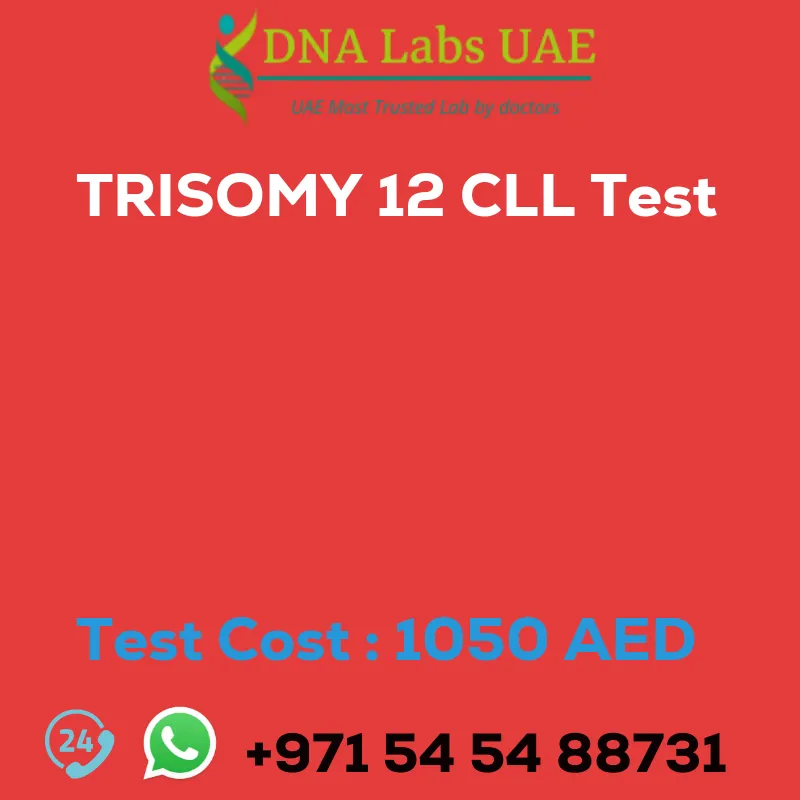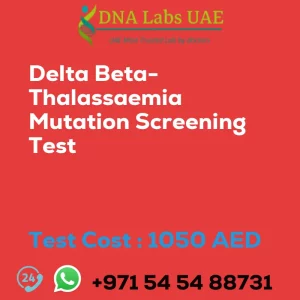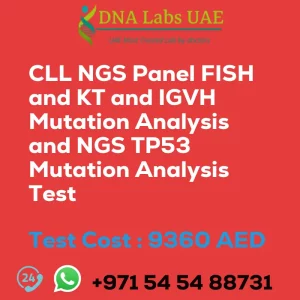TRISOMY 12 CLL Test – Cost, Symptoms, Diagnosis
Test Name: TRISOMY 12 CLL Test
Components: Sodium Heparin Vacutainer (2ml)
Price: 1050.0 AED
Sample Condition: Bone Marrow / Peripheral blood
Report Delivery: 3-4 days
Method: FISH
Test type: Genetics
Doctor: Oncology
Test Department:
Pre Test Information: TRISOMY 12 (CLL) can be done with a Doctors prescription. Prescription is not applicable for surgery and pregnancy cases or people planning to travel abroad.
Test Details:
Trisomy 12, also known as chronic lymphocytic leukemia (CLL), is a genetic abnormality characterized by the presence of an extra copy of chromosome 12 in the cells. CLL is a type of cancer that affects the white blood cells, specifically the lymphocytes. Trisomy 12 is one of the most common chromosomal abnormalities observed in CLL, occurring in approximately 20-30% of cases. It is more commonly seen in older individuals, with the median age of diagnosis being around 70 years.
The presence of trisomy 12 in CLL is associated with certain clinical and biological features. Patients with trisomy 12 CLL tend to have a more aggressive disease course, higher white blood cell counts, and larger lymph nodes compared to those without trisomy 12. They also have a higher risk of disease progression and shorter time to treatment.
The exact mechanism by which trisomy 12 contributes to CLL development and progression is not fully understood. However, it is believed to involve the dysregulation of genes located on chromosome 12, which may affect cell growth, survival, and immune function.
The diagnosis of trisomy 12 CLL is typically confirmed through genetic testing, such as fluorescence in situ hybridization (FISH) or chromosomal analysis. These tests can detect the presence of an extra copy of chromosome 12 in the CLL cells.
Treatment options for trisomy 12 CLL are similar to those for other forms of CLL and may include chemotherapy, targeted therapies, immunotherapy, and stem cell transplantation. The choice of treatment depends on various factors, including the stage and aggressiveness of the disease, the patient’s overall health, and their treatment goals.
In conclusion, trisomy 12 is a genetic abnormality commonly associated with chronic lymphocytic leukemia (CLL). It is associated with certain clinical and biological features and may impact the prognosis and treatment options for CLL patients.
| Test Name | TRISOMY 12 CLL Test |
|---|---|
| Components | Sodium Heparin Vacutainer (2ml) |
| Price | 1050.0 AED |
| Sample Condition | Bone Marrow \/ Peripheral blood |
| Report Delivery | 3-4 days |
| Method | FISH |
| Test type | Genetics |
| Doctor | Oncology |
| Test Department: | |
| Pre Test Information | TRISOMY 12 (CLL) can be done with a Doctors prescription. Prescription is not applicable for surgery and pregnancy cases or people planing to travel abroad. |
| Test Details |
Trisomy 12, also known as chronic lymphocytic leukemia (CLL), is a genetic abnormality characterized by the presence of an extra copy of chromosome 12 in the cells. CLL is a type of cancer that affects the white blood cells, specifically the lymphocytes. Trisomy 12 is one of the most common chromosomal abnormalities observed in CLL, occurring in approximately 20-30% of cases. It is more commonly seen in older individuals, with the median age of diagnosis being around 70 years. The presence of trisomy 12 in CLL is associated with certain clinical and biological features. Patients with trisomy 12 CLL tend to have a more aggressive disease course, higher white blood cell counts, and larger lymph nodes compared to those without trisomy 12. They also have a higher risk of disease progression and shorter time to treatment. The exact mechanism by which trisomy 12 contributes to CLL development and progression is not fully understood. However, it is believed to involve the dysregulation of genes located on chromosome 12, which may affect cell growth, survival, and immune function. The diagnosis of trisomy 12 CLL is typically confirmed through genetic testing, such as fluorescence in situ hybridization (FISH) or chromosomal analysis. These tests can detect the presence of an extra copy of chromosome 12 in the CLL cells. Treatment options for trisomy 12 CLL are similar to those for other forms of CLL and may include chemotherapy, targeted therapies, immunotherapy, and stem cell transplantation. The choice of treatment depends on various factors, including the stage and aggressiveness of the disease, the patient’s overall health, and their treatment goals. In conclusion, trisomy 12 is a genetic abnormality commonly associated with chronic lymphocytic leukemia (CLL). It is associated with certain clinical and biological features and may impact the prognosis and treatment options for CLL patients. |








